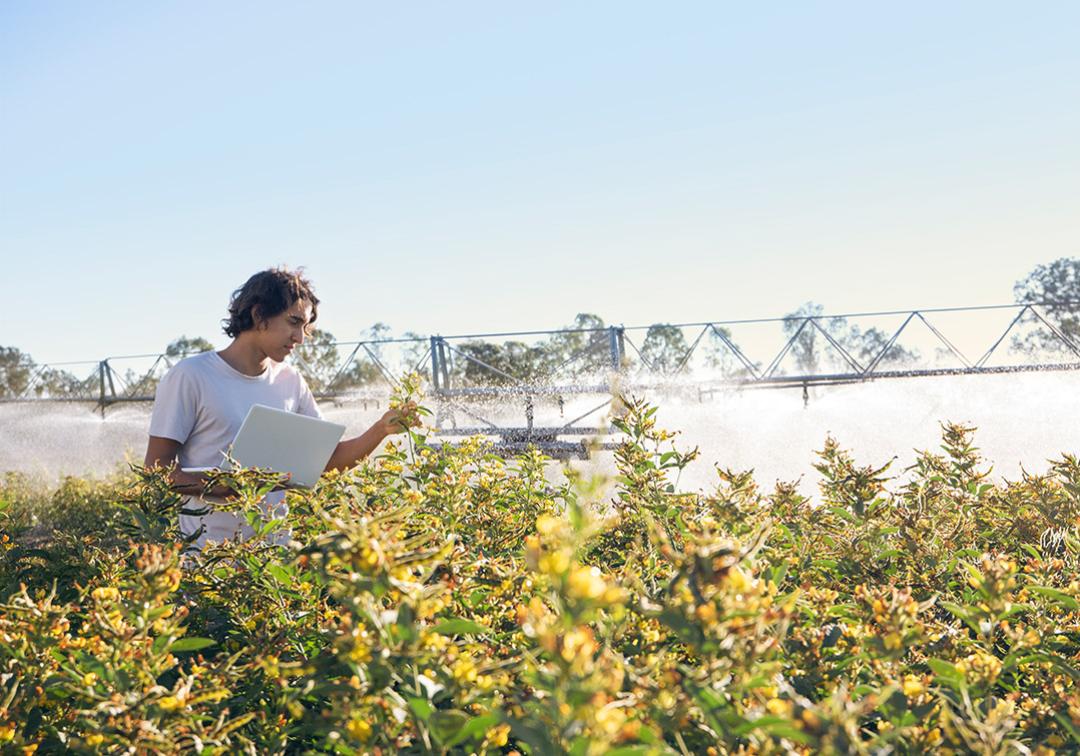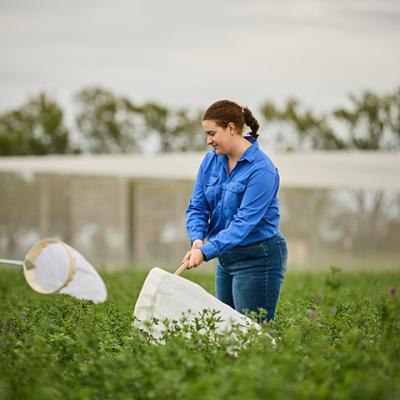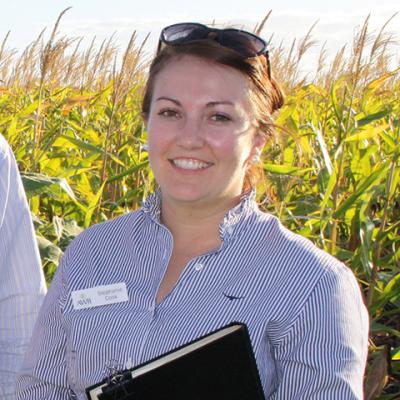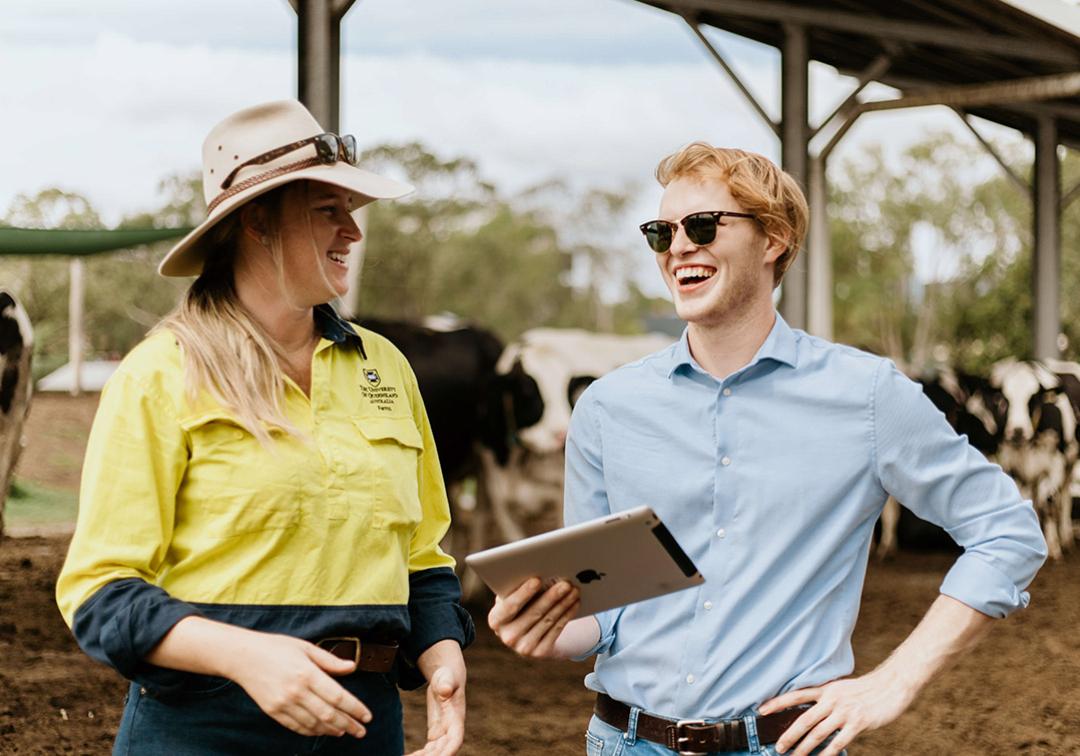
Bachelors of Agribusiness / Agricultural Science
Overview
Enhance your career prospects by combining business skills with agricultural science expertise.
Complete 2 programs in 4 years, preparing you for innovative management positions, both in Australia and globally.
Benefit from the research discoveries and industry connections of our world-class academics. They'll teach you in-demand practical field and lab skills and how to be part of developing solutions to the complex challenges of food security, agricultural sustainability and climate change.
Experience some of the best animal and agricultural facilities in the Southern Hemisphere, including the research greenhouses, a plant nursery, a commercial dairy, and more than 1,000 hectares of unique subtropical farmland.
Participate in industry visits and field trips, where you'll see some of the latest industry-transforming technology, like drones, GPS and crop sensors, in action.
For the Agricultural Science program, you'll gain in-depth foundations in animal biology, plant science, ecology, chemistry and data analysis, before specialising in one of 3 majors:
- agronomy (field crop production and soil management)
- animal science (livestock production, care and management)
- horticulture (garden and greenhouse crop cultivation).
In the Agribusiness component, you’ll learn about marketing, finance, people management and technology along the agrifood value chain.
Upon graduation, you'll be in demand with 6 jobs to every agricultural university graduate in Australia.
Program highlights
- Gain exposure to the latest technological advancements in agriculture through practicals, site visits and industry engagement.
- Access some of the best animal and agricultural facilities in the Southern Hemisphere across more than 1,000 hectares of subtropical farmland.
- Join one of Australia's leading agribusiness programs and learn from internationally respected business experts.
- Benefit from a program developed in close collaboration with the agricultural sector, both in Australia and internationally.
Majors
Tailor your studies to suit your goals. This program offers these options:
- Agronomy
- Animal Science
- Horticulture
How you'll learn
Your learning experiences are designed to best suit the learning outcomes of the courses you choose.
- Lectures
- Tutorials
- Work placements
- Overseas study
- Research experience
- Laboratory work
- Fieldwork
- Workshops
What you'll study
At UQ, degrees are called 'programs' and subjects are called 'courses'.
Career possibilities
Our programs prepare you for your first job and beyond. Depending on which major you choose, here are some of the careers you could be on your way to:
- Agronomist
- Research manager
- Crop scientist
- Animal technician
- Biosecurity officer
- Animal health officer
- Horticulturalist
- Propagator
- Plant scientist
Average annual salary range
Agronomist
seek.com.au
Average annual salary range
Biosecurity Officer
seek.com.au
Next steps after graduation
Your scientific expertise and knowledge of agribusiness managerial principles will place you in high demand within the Australian and international agriculture sectors.
A 2021 study from the Australian Farm Institute found there were 6 jobs to every agricultural university graduate in Australia.
You can expect to find employment in:
- government departments and agencies
- research institutions, including universities and CSIRO
- banks, financial institutions, and investment and insurance companies
- agribusinesses, such as agricultural service companies, seed companies, food producers and agricultural consultancies
- biosecurity, extension and animal production enterprises
- organisations involved in production, post-harvest and marketing of horticultural products
- commodity trade, sales and marketing companies
- export marketing and management companies
- feed mills, stock equipment manufacturers, and livestock and poultry health companies within allied industries
- property management companies
- supply chain management organisations
- tourism bodies.
Events
See all events
29 June - 6 July
Year 11 Queensland Chemistry Winter School

29 June
Queensland Biology Winter School, Year 12
Stories
See all stories
Uni life
What's it really like to study agribusiness and agriculture at UQ?
5-minute read

Careers
Career opportunities in agricultural science
4-minute read
Stories
See all stories
Uni life
What's it really like to study agribusiness and agriculture at UQ?
5-minute read

Careers
Career opportunities in agricultural science
4-minute read
Entry requirements
Prerequisites
- General English subject (Units 3 & 4, C)
- General Mathematics or Mathematical Methods (Units 3 & 4, C)
Prerequisites
- General English subject (Units 3 & 4, C)
- General Mathematics or Mathematical Methods (Units 3 & 4, C)
Entry score threshold
| ATAR / Rank | IB |
|---|---|
| 72 | 26.75 |
These are the lowest adjusted scores we made an offer to in Semester 1, 2025. Entry scores are based on the most recent Semester 1 intake and are updated in April each year. Meeting the entry score threshold doesn't guarantee admission.
Guarantee your place at UQ: If you meet our guaranteed minimum ATAR you could secure an offer for your preferred program.
English language requirements
IELTS overall 6.5; reading 6; writing 6; speaking 6; listening 6. For other English Language Proficiency Tests and Scores approved for UQ
TOEFL iBT (including Paper Edition) - Overall 87, listening 19, reading 19, writing 21 and speaking 19.
PTE Academic - Overall Score of 64 and 60 in all sub bands.
BE - A minimum overall grade of 4 plus a minimum grade of C in all macro skills.
CES - Overall 176 and 169 in all sub bands.
OET is not accepted.
There are other ways to meet the English language requirements. For some programs, additional conditions apply.
Student visas
International students who are accepted into full-time study in the Bachelors of Agribusiness / Agricultural Science are eligible to apply for an Australian student visa (subclass 500).
There are a number of requirements you must satisfy before a visa is granted, including the Genuine Student (GS) requirement.
Entry score range
This table shows the range of entry scores for recent secondary students offered a place in the B Agb/BAgriSc for Semester 1, 2025
| Without adjustments | With adjustments | |
|---|---|---|
| Highest | 98.4 | 99.95 |
| Median | 83.9 | 86.25 |
| Lowest | 70.9 | 72.9 |
Who you'll study with
Here's a snapshot of our student intake for this program in Semester 1, 2025:
| Applicant background | Number of students | Percentage of all students |
|---|---|---|
(A) Higher education study | 5 | 13.2% |
(B) Vocational Education and Training (VET) study | 5 | 13.2% |
(C) Work and life experience | <5 | <5 |
| (D) Recent secondary education | ||
| 24 | 63.2% |
| 0 | 0% |
| 0 | 0% |
International students | <5 | <5 |
Total | 38 | 100% |
"<5" — The number of students is less than 5.
N/A — Students not accepted in this category.
N/P — Not published. The number is hidden to protect the privacy of students in other cells.
Need help meeting the entry requirements?
Additional application information
Additional application information
Majors
Majors
Tailor your studies to suit your goals. This program offers these options:
Majors
Tailor your studies to suit your goals. This program offers these options:
Fees and Scholarships
Indicative annual fee
Approximate yearly cost of tuition (16 units). Your fees will vary according to your selected courses and study load. Fees are reviewed each year and may increase.
$7,745
2026
Approximate yearly cost of tuition (16 units). Your fees will vary according to your study load. Fees are reviewed each year and may increase.
AUD $54,096
2026
Additional costs
- This program includes one or more compulsory field trip courses that may incur additional costs. Please check the course descriptions for more information.
Government assistance
Financial aid
As an international student, you might be eligible for financial aid – either from your home country, or from the Australian Government.
HECS-HELP
Domestic places in the Bachelors of Agribusiness / Agricultural Science are Commonwealth supported, as long as you meet all Commonwealth supported place eligibility requirements.
This means the cost of your education is shared between you and the Australian Government. Instead of tuition fees, Commonwealth supported students pay what are called student contribution amounts.
If you have a Commonwealth supported place, you may also be eligible for HECS-HELP. This is an Australian Government loan scheme to assist eligible students with the cost of their student contribution amounts.
Centrelink support
The Australian Government offers a number of income-support payments to eligible Australian university students.
Scholarships
You may be eligible for more than 100 scholarships, including:
How to apply
Applying online
If your senior schooling is from outside Australia, you can submit your application to UQ. Or, if you prefer, you can use an approved UQ agent near you.
The program code for the Bachelors of Agribusiness / Agricultural Science is 2449.
How to apply for undergraduate study
If your senior schooling is from Australia
Submit your application to the Queensland Tertiary Admissions Centre if you're an international student who is currently studying:
- Australian Year 12 (in Australia or another country), or
- the International Baccalaureate in Australia.
The QTAC code for the Bachelors of Agribusiness / Agricultural Science is 766601.
Applying through QTAC
All domestic applications should be submitted to the Queensland Tertiary Admissions Centre (QTAC).
The QTAC code for the Bachelors of Agribusiness / Agricultural Science is 766601.
Important dates
If you’re studying Year 12 in Australia, go to the QTAC website to check the closing date for this program.
If you’re applying to UQ, the closing date for this program is:
- To commence study in semester 1 - November 30 of the previous year.
Visa processing times vary. Apply and accept your offer as early as you can.
To learn more about UQ dates, including semester start dates, view the Academic Calendar.
Important dates
To check the closing date for this program, go to the QTAC website.
To learn more about UQ dates, including semester start dates, view the Academic Calendar.
Admissions schemes
Applying to university can be both exciting and daunting, which is why we’ve tried to make the process as simple as we can.
We have several schemes in place to improve your chances of getting a place at UQ.
Pathway options
A rank or score doesn’t determine your potential.
If you're not offered a place in your first-choice program – or if you don't meet the entry requirements – you still have a number of options.
Aboriginal and Torres Strait Islander applicants
For support with applying – or if you have any questions about university life – get in touch with our Aboriginal and Torres Strait Islander Studies (ATSIS) Unit.
Explore other programs
Express yourself. And your interest.
They say choosing a degree is hard, which is why we've made it easy. Register your interest and we'll send you everything you need to know about applying to UQ.






